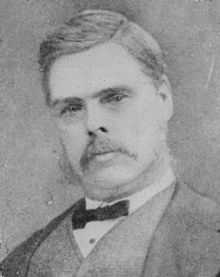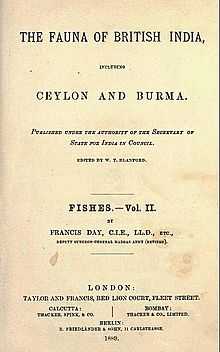Francis Day


Francis Day CIE (2 March 1829 – 10 July 1889) was Inspector-General of Fisheries in India (from circa 1871) and Burma and a pioneer ichthyologist who first described 343 of the marine an freshwater fishes of British India.[1]
Life
He was born in Maresfield, East Sussex, UK, the third son of William and Ann Day. He studied at Shrewsbury School under a Dr Kennedy. Taking an interest in medicine, he worked for a while at St. George's Hospital. He became an Assistant Surgeon in the Madras Army, British East India Company, in 1852.[2]
Day took an interest in the fishes of India. He was responsible for the introduction of trout into the streams in the Nilgiris in 1866 for which he received an award from the Societe d'Acclimatation of France. In 1867 he was directed to study the condition of fisheries in India. He conducted studies in the states of Orissa, Bengal, Burma and Andamans, but an accident forced him to return to England. Returning to India, he was posted Inspector General of Fisheries. Day subsequently wrote a monograph The Fishes of India; being a Natural History of the Fishes... of India, Burma, and Ceylon, illustrated by himself and George Henry Ford that was published between 1875–1878, with a supplement in 1888, and two volumes on "Fishes" in The Fauna of British India, Including Ceylon and Burma series in which he described over 1400 species. He also wrote on British and Irish Salmonidae, which he illustrated with nine plates, the colouring of which was done by Miss Florence Woolward.[3] Day also published The Fishes of Malabar in 1865.[4]
He retired in 1877.
Francis Day was a Fellow of the Linnaean Society and a Fellow of the Zoological Society; he was created a Companion of the Order of the Indian Empire in 1885. He was decorated with the Order of the Crown of Italy. Francis Day was granted an honorary LLD by the University of Edinburgh.[2]
Although Day was considered an expert on the fishes of India, Albert Günther of the British Museum repeatedly questioned many of Day's observations.[5] One outcome of this professional friction resulted in Day's selling an extensive collection of fishes to the Australian Museum in 1883, ignoring the British Museum, the expected recipient.[6]
Day was an active member, and president of the Cheltenham Natural Sciences Society and presented papers to them. He was also was an active member of the Cotteswold Naturalists Field Club, where he was vice president.[4]
He died at his residence, Kenilworth House, Cheltenham, on 10 July 1889[7] of cancer of the stomach[8] and was buried at Cheltenham cemetery.
Family
Day married twice : first, on 3 Nov. 1857, Emma (died 1869), daughter of Dr. Charles Covey of Basingstoke; and, secondly, on 13 April 1872, Emily (died 1873), youngest daughter of the Rev. Thomas Sheepshanks, vicar of St. John's, Coventry. [2]
Works
- Day, Francis (1889) The Fauna of British India, Including Ceylon and Burma. Fishes. Volume 1. Online
- Day, Francis (1889) The Fauna of British India, Including Ceylon and Burma. Fishes. Volume 2. Online
References
- ↑ Australian Museum: the fish collection of Dr Francis Day
- ↑ 2.0 2.1 2.2 Woodward 1901.
- ↑ The Field, July 1899.
- ↑ 4.0 4.1 "Death of Dr. Francis Day". Gloucester Journal: 6. 20 July 1889.
- ↑ "Examination of certain "Remarks on Indian Fishes" made by Mr. Francis Day in the Proceedings of the Zoological Society". Proceedings of the Zoological Society of London: 761–766. 1871.
- ↑ Australian Museum: the fish collection of Dr Francis Day
- ↑ Obituary, The London Times, 15 July 1889
- ↑ Madrass Mail
- Attribution
![]() This article incorporates text from a publication now in the public domain: Woodward, Bernard Barham (1901). "Day, Francis (1829-1889)". In Sidney Lee. Dictionary of National Biography, 1901 supplement. London: Smith, Elder & Co.
This article incorporates text from a publication now in the public domain: Woodward, Bernard Barham (1901). "Day, Francis (1829-1889)". In Sidney Lee. Dictionary of National Biography, 1901 supplement. London: Smith, Elder & Co.
Sources
- Whitehead, P.J.P. & P.K. Talwar, 1976. Francis Day (1829–1889) and his collections of Indian Fishes. Bulletin of the British Museum (Natural History), Historical Series 5(1): 1–189, pls. 1–4.
External links
| Wikimedia Commons has media related to Francis Day. |
|